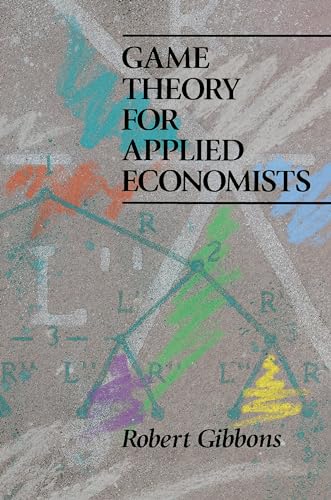Articoli correlati a Game Theory for Applied Economists

Sinossi
This book introduces one of the most powerful tools of modern economics to a wide audience: those who will later construct or consume game-theoretic models. Robert Gibbons addresses scholars in applied fields within economics who want a serious and thorough discussion of game theory but who may have found other works overly abstract. Gibbons emphasizes the economic applications of the theory at least as much as the pure theory itself; formal arguments about abstract games play a minor role. The applications illustrate the process of model building--of translating an informal description of a multi-person decision situation into a formal game-theoretic problem to be analyzed. Also, the variety of applications shows that similar issues arise in different areas of economics, and that the same game-theoretic tools can be applied in each setting. In order to emphasize the broad potential scope of the theory, conventional applications from industrial organization have been largely replaced by applications from labor, macro, and other applied fields in economics. The book covers four classes of games, and four corresponding notions of equilibrium: static games of complete information and Nash equilibrium, dynamic games of complete information and subgame-perfect Nash equilibrium, static games of incomplete information and Bayesian Nash equilibrium, and dynamic games of incomplete information and perfect Bayesian equilibrium.
Le informazioni nella sezione "Riassunto" possono far riferimento a edizioni diverse di questo titolo.
Recensione
"Lucid and detailed introduction to game theory in an explicitly economic context."--Cooperative Economic News Service
Contenuti
| 1 | Static Games of Complete Information | 1 |
| 1.1 | Basic Theory: Narmal-Form Games and Nash Equilibrium | 2 |
| 1.1.A | Normal-Form Representation of Games | 2 |
| 1.1.B | Iterated Elimination of Strictly Dominated Strategies | 4 |
| 1.1.C | Motivation and Definition of Nash Equilibriuin | 8 |
| 1.2 | Applications | 14 |
| 1.2.A | Cournot Model of Duopoly | 14 |
| 1.2.B | Bertrand Model of Duopoly | 21 |
| 1.2.C | Final-Offer Arbitration | 22 |
| 1.2.D | The Problem of the Commons | 27 |
| 1.3 | Advanced Theory: Mixed Strategies and Existence of Equilibriutn | 29 |
| 1.3.A | Mixed Strategies | 29 |
| 1.3.B | Existence of Nash Equilibrium | 33 |
| 2 | Dynamic Games of Complete Information | 55 |
| 2.1 | Dynamic Games of Complete and Perfect Information | 57 |
| 2.1.A | Theory: Backwards Induction | 57 |
| 2.1.B | Stackelberg Model of Duopoly | 61 |
| 2.1.C | Wages and Employment in a Unionized Firm | 64 |
| 2.1.D | Sequential Bargaining | 68 |
| 2.2 | Two-Stage Games of Complete but Imperfect Information | 71 |
| 2.2.A | Theory: Subgame Perfection | 71 |
| 2.2.B | Bank Runs | 73 |
| 2.2.C | Tariffs and Imperfect International Competition | 75 |
| 2.2.D | Tournaments | 79 |
| 2.3 | Repeated Games | 82 |
| 2.3.A | Theory: Two-Stage Repeated Games | 82 |
| 2.3.B | Theory: Infinitely Repeated Games | 88 |
| 2.3.C | Collusion between Cournot Duopolists | 102 |
| 2.3.D | Efficiency Wages | 107 |
| 2.3.E | Time-Consistent Monetary Policy | 112 |
| 2.4 | Dynamic Games of Complete but Imperfect Information | 115 |
| 2.4.A | Extensive-Form Representation of Games | 115 |
| 2.4.B | Subgame-Perfect Nash Equilibriuin | 122 |
| 3 | Static Games of Incomplete Information | 143 |
| 3.1 | Theory: Static Bayesian Ganies and Bayesian Nash Equilibrium | 144 |
| 3.1.A | An Example: Cournot Competition under Asymmetric Information | 144 |
| 3.1.B | Normal-Form Representation of Static Bayesian Games | 146 |
| 3.1.C | Definition of Bayesian Nash Equilibrium | 149 |
| 3.2 | Applications | 152 |
| 3.2.A | Mixed Strategies Revisited | 152 |
| 3.2.B | An Auction | 155 |
| 3.2.C | A Double Auction | 158 |
| 3.3 | The Revelation Principle | 164 |
| 4 | Dynamic Games of Incomplete Information | 173 |
| 4.1 | Introduction to Perfect Bayesian Equilibrium | 175 |
| 4.2 | Signaling Games | 183 |
| 4.2.A | Perfect Bayesian Equilibrium in Signaling Games | 183 |
| 4.2.B | Job-Market Signaling | 190 |
| 4.2.C | Corporate Investment and Capital Structure | 205 |
| 4.2.D | Monetary Policy | 208 |
| 4.3 | Other Applications of Perfect Bayesian Equilibrium | 210 |
| 4.3.A | Cheap-Talk Games | 210 |
| 4.3.B | Sequential Bargaining under Asymmetric Information | 218 |
| 4.3.C | Reputation in the Finitely Repeated Prisoners' Dilemnia | 224 |
| 4.4 | Refinements of Perfect Bayesian Equilibrium | 233 |
| Index | 257 |
Le informazioni nella sezione "Su questo libro" possono far riferimento a edizioni diverse di questo titolo.
Compra usato
Condizioni: molto buonoGRATIS per la spedizione in U.S.A.
Destinazione, tempi e costiRisultati della ricerca per Game Theory for Applied Economists
Game Theory for Applied Economists
Da: ThriftBooks-Dallas, Dallas, TX, U.S.A.
Hardcover. Condizione: Very Good. No Jacket. May have limited writing in cover pages. Pages are unmarked. ~ ThriftBooks: Read More, Spend Less 0.95. Codice articolo G0691043086I4N00
Quantità: 1 disponibili
Game Theory for Applied Economists
Da: Affordable Collectibles, Columbia, MO, U.S.A.
Hardcover. Condizione: Fair. NO DJ. Otherwise very good with no marks. Codice articolo 24060200
Quantità: 1 disponibili

